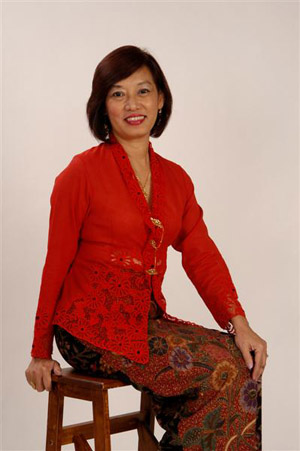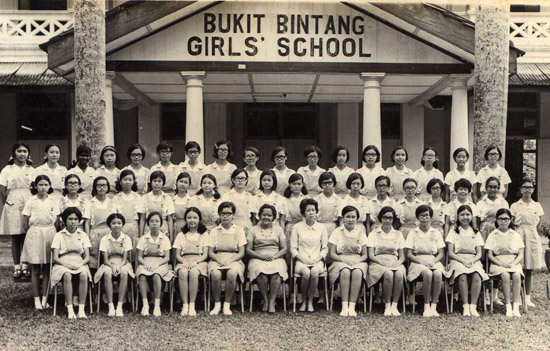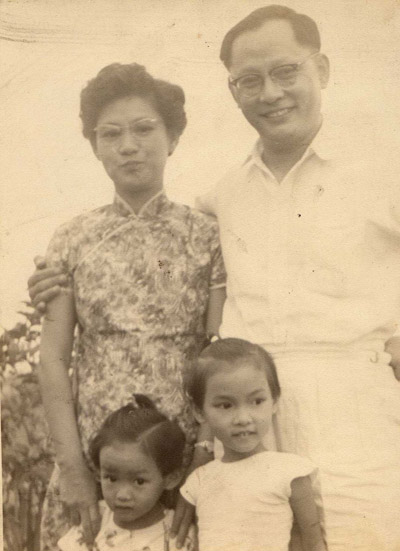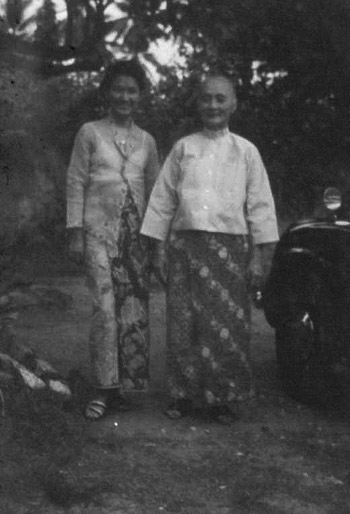
GOSTAN. Outstation. Off-day. Cousin brother. Koochi-rat. These are all expressions unique to Malaysia recorded by author Lee Su Kim in her bestselling book Manglish: Malaysian English at its Wackiest.
Lee has authored eight books, including Malaysian Flavours: Insights into Things Malaysian and A Nyonya in Texas: Insights of a Straits Chinese Woman in the Lone Star State. She is associate professor at the School of Language Studies and Linguistics in Universiti Kebangsaan Malaysia, and is a founder member and president of the Peranakan Baba Nyonya Association of Kuala Lumpur.
The Nut Graph interviewed Lee on 20 July 2010 at her office on campus in Bangi. Lee’s latest book, Kebaya Tales: Of Matriarchs, Maidens, Mistresses and Matchmakers, a collection of short stories revolving around the lives of the Peranakan nyonyas, will be published in October 2010.
TNG: Where were you born and where did you grow up?
Lee Su Kim: I was born in Bangsar Hospital, Kuala Lumpur. I grew up on a little street of pre-war houses, near Changkat Bukit Bintang, in Kuala Lumpur. The street is still there – Jalan Sin Chew Kee, off Jalan Galloway. There were old, long houses, with high ceilings, antique wooden staircases, stained glass windows and beautiful Italian tiles.
Everybody knew everybody on the street. My father and the gentleman opposite and a few others grew up together on the same street … Their families and the next generation, which was us, also became good friends.
There were lots of games, we’d celebrate festivals together, mourn people’s deaths together. It’s rare now to have a communal feeling like that.
What are some of your other memories of growing up?
I have wonderful memories of my school, Bukit Bintang Girls School, which I attended from kindergarten right up to Form Six. I’d walk to school. It was just 20 minutes away. There was never any fear or worry we’d get robbed or have our bags snatched. We’d carry our books in wicker baskets, and we’d stop by the market and buy flowers [for] the classroom.
The school was pulled down, much to our horror. I was on the committee fighting for its preservation … They didn’t even give us a brass plaque to commemorate the school. Now, people talk about having a memorial for Pudu Jail. But what about our school? We produced so many good people for the country, some even internationally renowned.
I remember we had a toilet campaign in school. Regardless whether you were the daughter of a pauper or king – and we had two princesses then – we all had to take turns to clean the toilets. The toilets were very clean, unlike nowadays, when it’s so filthy.

Can you trace your ancestry?
My father is a Baba from Malacca. [As part of an undergraduate university project], I did research in Malacca with my parents and we managed to trace our ancestry way back to the first person who came here from China. It goes back six to seven generations.
To me, to call us “pendatang” is really an insult. We’ve been here for so long, a few hundred years, and we’ve contributed so much to the country, as many Peranakan families have. We know our ancestors were Chinese traders who came and married local women and settled in Malacca.
My mother’s a Nyonya from Penang. On her side, we’ve probably been here more than six generations, too.
We lived with my grandparents, and a whole plethora of languages was spoken at home. Grandpa spoke Baba Malay, grandma spoke Baba Malay, Hakka and Cantonese. My father spoke English. He was from Victoria Institution and had good command of English, but he spoke Baba Malay to his father. Mum spoke English and Hokkien. We also had a Chinese amah who spoke Cantonese to us. We switched from one language to another without even realising it.
Our food was a fusion of Penang Peranakan and Malacca Peranakan dishes. We also had dishes with European and British influence, such as chicken chop, pork chop with Worcester sauce, and roti babi accompanied with Tabasco sauce.

Are there any stories you hold on to from your family?
There’s this story my mum told me about the Japanese occupation that stuck with me. The Japanese were known to treat the Chinese quite brutally during that time, and there were stories of young girls who had to disguise themselves, make themselves look ugly and hide from Japanese soldiers.
When things stabilised, my mum went out to work, and she had a Japanese boss. She told me he was kind, gentle, and a good boss, which just shows the stereotype of them is not all accurate.
One day at work, he started weeping; he was so upset and devastated. And when she asked him what had happened, he told her, “My family, all gone, all gone.” “How?” my mum asked. “Hiroshima. Bomb” was his answer.
There’s another story of how my father fell in love with my mum. There was a photograph of her – pretty, young and innocent standing by a peacock flower tree. The story is my father fell in love with that photograph after seeing it in a friend’s album.
[After making enquiries] and sending someone to approach my mum’s family, and after they checked out his background, they met. They could never be by themselves during this time; they always had a chaperone. My father would bring a book to show my mother, and they would sit down and read it together. And that was how they got to know each other.
How do you connect to these stories as a Malaysian?
We have a unique culture that shows there is nothing to lose in being open-minded and resourceful, to adopt and adapt, and to avoid ethnocentrism. We have multiple identities, layers upon layers. The Peranakan culture [itself] has influences from Malay, Chinese, Javanese, Balinese, Sumatran, British, Dutch, Portuguese, and Indian cultures.
When I was in my teens, I experienced some identity dissonance. I felt, “What am I? I’m not really Malay, Indian, or Chinese.” I used to read Enid Blyton and stories of a little girl named Heidi and wished I was very English or very Swiss. I asked myself, “Why can’t I be something that’s 100% grounded in something, with a strong base in one culture and its language?”
But now I’m glad I’m not. I’m happy about my multi-layered identity, and my cultural heritage. At that time, I felt I wasn’t centred in anything. Now, I think we’re so privileged. We can access worlds, enter and exit different cultures and communities with ease. [Whether in] New Zealand or the US, Chinatown or Little India, or with all sorts of ethnic groups, we know how to behave, to “tune in” and feel comfortable. You never belong 100%, and yet you can belong anywhere – I think that’s so much better. Having a repertoire of languages and multiple identities.

Describe the kind of Malaysia you would like for yourself and for future generations.
I’d like a country where there is freedom of thought and expression … with ideas expressed in a sensible, culturally sensitive way. Where we’re open to ideas and innovation, and we’re not constantly being told what to do.
I’d like a thinking society, one with more maturity. I find there’s a dumbing-down of sorts that has occurred for a lot of things. People are not supposed to ask questions. If you question, it’s often misunderstood to mean you’re critical and don’t care. Sometimes, it’s just the opposite – you ask questions because you care.
I’d like for us to have open discussion and debate, done in a civil way. Where people can agree to disagree, and not take it personally or as a challenge. Where there is less emphasis maybe on things like food, [and more emphasis] on literature, critical thinking, culture and the arts. There are a lot of articles in the media about food and not a lot about the rest. Because we cannot talk about religion, politics, sex. So all that’s safe to talk about is food.
I’d like us to become a world player that can take its place with pride among other countries and contribute world-class talent, artistes, scholars and thinkers. We have so much talent in many fields, amazing cultures to draw upon.
I would like to see a country being led by good leaders with integrity and free of corruption. A country where all Malaysians can call themselves Malaysians with pride and deep affection, and know that our country’s future and destiny is for all Malaysians. ![]()
The book Found in Malaysia, featuring 50 of our best interviews plus four exclusives that have previously not been published, is now available at all good bookstores for RM45.
The Nut Graph needs your support


Lainie says
My mother’s grew up on Sin Chew Kee, and I can only imagine the communal atmosphere my mother and aunts described of their childhood. Was told my grandfather would get a little trophy, and all the children would take part in a ping pong competition for it. They would also set up a screen in the middle of the road, and everyone would watch a film and share durian. Sounds like wonderful times. I wish I knew my maternal grandparents and could hear more about their life on SCK.